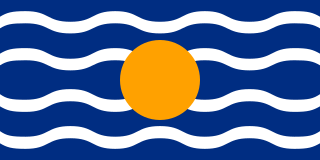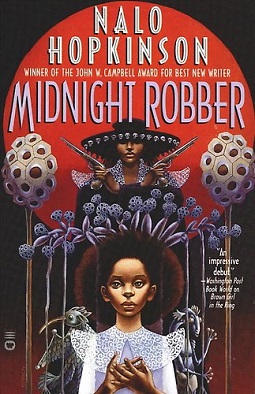The history of Trinidad and Tobago begins with the settlements of the islands by Indigenous First Peoples. Trinidad was visited by Christopher Columbus on his third voyage in 1498,, and claimed in the name of Spain. Trinidad was administered by Spanish hands until 1797, but it was largely settled by French colonists. Tobago changed hands between the British, French, Dutch, and Courlanders, but eventually ended up in British hands following the second Treaty of Paris (1814). In 1889, the two islands were incorporated into a single political entity. Trinidad and Tobago obtained its independence from the British Empire in 1962 and became a republic in 1976.

Eric Eustace Williams was a Trinidad and Tobago politician. He has been described as the "Father of the Nation", having led the then-British Colony of Trinidad and Tobago to majority rule on 28 October 1956, to independence on 31 August 1962, and republic status on 1 August 1976, leading an unbroken string of general elections victories with his political party, the People's National Movement, until his death in 1981. He was the first Prime Minister of Trinidad and Tobago and also a Caribbean historian, most noted for his book entitled Capitalism and Slavery.

Tobago is an island and ward within the Republic of Trinidad and Tobago. It is located 35 kilometres northeast of the larger island of Trinidad and about 160 kilometres off the northeastern coast of Venezuela. It lies to the southeast of Grenada and southwest of Barbados.

The West Indies Federation, also known as the West Indies, the Federation of the West Indies or the West Indian Federation, was a short-lived political union that existed from 3 January 1958 to 31 May 1962. Various islands in the Caribbean that were part of the British Empire, including Trinidad and Tobago, Barbados, Jamaica, and those on the Leeward and Windward Islands, came together to form the Federation, with its capital in Port of Spain, Trinidad and Tobago. The expressed intention of the Federation was to create a political unit that would become independent from Britain as a single state – possibly similar to Canada, the Federation of Australia, or the Federation of Rhodesia and Nyasaland. Before that could happen, the Federation collapsed due to internal political conflicts over how it would be governed or function viably. The formation of a West Indian Federation was encouraged by the United Kingdom, but also requested by pan-Caribbean nationalists.

The steelpan is a musical instrument originating in Trinidad and Tobago. Steelpan musicians are called pannists.

The Trinidad and Tobago Carnival is an annual event held on the Monday and Tuesday before Ash Wednesday in Trinidad and Tobago. This event is well known for participants' colorful costumes and exuberant celebrations. There are numerous cultural events such as "band launch" fetes running in the lead up to the street parade on Carnival Monday and Tuesday. Traditionally, the festival is associated with calypso music, developed by enslaved West and Central Africans in 17th century Trinidad; however, Soca music has begun to replace calypso as the more popular musical genre for Carnival. Costume, stick-fighting, limbo, and steelpan competitions are important components of the festival.
Afro-Caribbean or African Caribbeanpeople are Caribbean people who trace their full or partial ancestry to Africa. The majority of the modern Afro-Caribbean people descend from the Africans taken as slaves to colonial Caribbean via the trans-Atlantic slave trade between the 15th and 19th centuries to work primarily on various sugar plantations and in domestic households. Other names for the ethnic group include Black Caribbean, Afro- or Black West Indian, or Afro- or Black Antillean. The term West Indian Creole has also been used to refer to Afro-Caribbean people, as well as other ethnic and racial groups in the region, though there remains debate about its use to refer to Afro-Caribbean people specifically. The term Afro-Caribbean was not coined by Caribbean people themselves but was first used by European Americans in the late 1960s.
Earl Wilbert Lovelace is a Trinidad and Tobago novelist, journalist, playwright, and short story writer. He is particularly recognized for his descriptive, dramatic fiction on Trinidadian culture: "Using Trinidadian dialect patterns and standard English, he probes the paradoxes often inherent in social change as well as the clash between rural and urban cultures." As Bernardine Evaristo notes, "Lovelace is unusual among celebrated Caribbean writers in that he has always lived in Trinidad. Most writers leave to find support for their literary endeavours elsewhere and this, arguably, shapes the literature, especially after long periods of exile. But Lovelace's fiction is deeply embedded in Trinidadian society and is written from the perspective of one whose ties to his homeland have never been broken."
Trinidad and Tobago literature has its roots in oral storytelling among African slaves, the European literary roots of the French creoles and in the religious and folk tales of the Indian indentured immigrants. It blossomed in the 20th century with the writings of C. L. R. James, V. S. Naipaul and Saint Lucian-born Derek Walcott as part of the growth of West Indian literature.
Caribbean folklore includes a mix of traditions, tales, and beliefs of the Caribbean region. Caribbean folklore was shaped by a history filled with violence, colonialism, slavery, and multicultural influences. Specifically, influences from African, Creole, Asian, Indigenous American, European, and Indian cultures converged in the Caribbean to create a blend of lore unique to the region. Caribbean folklore has a variety of different characters that portray different traits. Folklore has evolved by blending folk speech, Creole dialogue, and various other elements that create the literary form of folklore, which portrays the "spirit" and "soul" of the Caribbean. Many themes are covered in Caribbean folklore, including colonial legacies, diversity in cultures, and the search for identity. Writers such as Nalo Hopkinson use these folklore elements in their writings by weaving myths and traditions into their modern-day storytelling.
In the folklore of Trinidad and Tobago the Lagahoo or Lugarhou is a mythical shapeshifting monster. It is cousin to the French and the Germanic werewolf .
Chinese Caribbean people are people who are predominantly of Han Chinese ethnic origin living in the Caribbean. There are small but significant populations of Chinese and their descendants in all countries of the Greater Antilles. They are all part of the large Chinese diaspora known as Overseas Chinese.

Midnight Robber is a science fiction bildungsroman by Jamaican-Canadian writer Nalo Hopkinson. Warner Aspect published the novel in 2000.
For a history of Afro-Caribbean people in the UK, see British African Caribbean community.

Trinidadians and Tobagonians, colloquially known as Trinis or Trinbagonians, are the people who are identified with the country of Trinidad and Tobago. The country is home to people of many different national, ethnic and religious origins. As a result, Trinidadians do not equate their nationality with race and ethnicity, but with citizenship, identification with the islands as whole, or either Trinidad or Tobago specifically. Although citizens make up the majority of Trinidadians, there is a substantial number of Trinidadian expatriates, dual citizens and descendants living worldwide, chiefly elsewhere in the Anglosphere.

Gérard Anthony Besson HBM was a Trinidadian writer and publisher.

Mycroft Holmes is a mystery novel by Kareem Abdul-Jabbar and Anna Waterhouse. It involves Sir Arthur Conan Doyle's character of Mycroft Holmes, the older brother of Sherlock Holmes, solving a mystery early in his career as a government official. It is Abdul-Jabbar's first adult novel.
Mohamed Ismith Khan, better known as Ismith Khan, was a Trinidad and Tobago-born American author and educator. He is best known for his novel The Jumbie Bird, a semi-autobiographical work which blends Indian and Afro-Caribbean mythology and experience to explore the creation of a new Indo-Caribbean identity.

Trinidadian and Tobagonian nationality law is regulated by the Trinidad and Tobago Constitution Order of 1962, as amended; the 1976 Citizenship Act, and its revisions; and various British Nationality laws. These laws determine who is, or is eligible to be, a national of Trinidad and Tobago. Trinidadian and Tobagonian nationality is typically obtained either on the principle of jus soli, i.e. by birth in Trinidad and Tobago or under the rules of jus sanguinis, i.e. by birth abroad to parents with Trinidadian and Tobagonian nationality. It can be granted to persons with an affiliation to the country, or to a permanent resident who has lived in the country for a given period of time through naturalisation. There is not currently a program in Trinidad and Tobago for persons to acquire nationality through investment in the country. Nationality establishes one's international identity as a member of a sovereign nation. Though it is not synonymous with citizenship, for rights granted under domestic law for domestic purposes, the United Kingdom, and thus the commonwealth, have traditionally used the words interchangeably.
Albert Ramsawack was a Trinidad and Tobago folklorist, author, broadcaster and educator who was the author of more than 300 children's stories and books including the Folklore Stories of Trinidad and Tobago. Born in Sangre Grande, Ramsawack lived most of his life in Rousillac in south Trinidad. Ramsawack was awarded the Hummingbird Medal (Silver) in 2004 and a Certificate of Recognition from the Environmental Management Authority in 2021 in recognition of his environmental stewardship.









